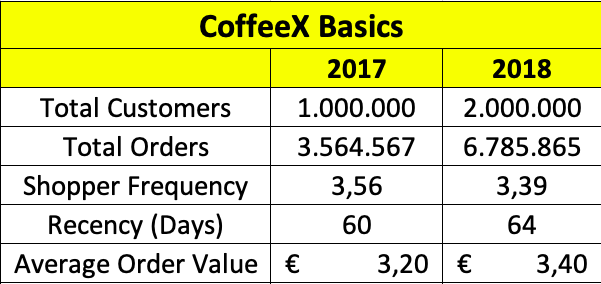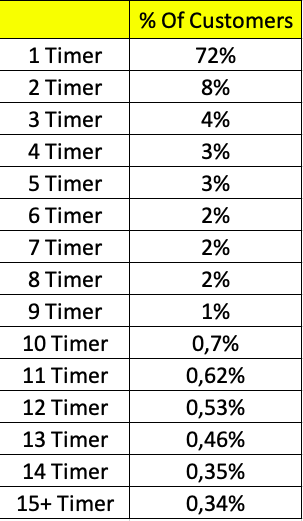QSR, casual chains, fine dining, fashion, malls… Customer loyalty programs became essential for industries in dynamic and highly competitive industries. Probably you know that, but in this article I want to tell the failure scenario of retail company (let’s call it Coffee X) I will share some of my experiences from past clients. I will mask their name but let’s boil all the facts in a single imaginary case.This article will have several parts like:
- First meeting with the client
- Some Analysis & Program Creation
- Creation of Campaign Mechanics
- Client’s attitude during the program
- Escalation of commitment
- Failure
Our client Coffee X will forget it’s objective during the way but I hope you won’t. In this part, I will talk about program creation process.First Meeting with Coffee XCoffee X is a new generation espresso bar which is serving high quality (if you say so) espresso based beverages with variety of options in Europe. Company is operating in 6 European countries with franchising model. Because they are not operate in master franchise model, service level standardization is low but they are trying to create a high brand awareness with digital ads. In 2018, they spend €1M in digital advertising (include social media & search engine ads, influencer marketing, and native advertising). Also Coffee X have high ATL & BTL budget if we exclude all of their digital efforts.CEO of the company Catherine is also founder of Coffee X. She created the company in 2002 and opened more than 30 stores with her individual (also some friends & family) investments. After that big European fund acquired her company then the new chapter had started. As a CEO of the company, she faced with the franchise based business model and now her objective shifted from high frequency & sustainability to high customer & franchise revenue. Because the market have highly competitive and naturally very easy to enter; with her CMO, she found the peace in short-term pop-up campaigns. When I met with Catherine and her CMO Carlos, their recent campaign was “Buy 2 Get 1 on Friday” So you know what I mean with short-term pop-up campaigns. You may say it is effective time-limited campaign however it was not. When you have a short-term revenue objective, you only see the gross margin in the end of the day. If it was profitable, then it is OK. But no one will talk you about the opportunities you left behind. Also you won’t find anyone talk about sustainable shopper behavior. Because of that, Catherine said
“ Our competitors are managing loyalty programs. Even small local coffee shop is managing simple punch card program and it is working! We should develop a program which is very cost effective with high ROI.”
Well… There is no vision, there is only budget there. We wanted to examine their current behavioral data. Coffee X already have a mobile app where customers can list the menu , order their take-away coffee before s/he arrived to coffee store, and pay online. Their CRM infrastructure was not the most flexible system on the earth, just allowed us to create time limited bundle campaigns like “Buy 2 Get 1 on Friday” Let’s create some initial basic KPIs with some data:

In this fake data, important thing to understand, frequency is decreasing when we compare with the previous year. Economy is shrinking globally but more importantly company failed to create frequency habit on it’s existing customers. Recency is also telling the general story. So, the main problem is frequency? Let’s find out.Some Analysis & Program CreationFirst things first, we should understand that switching cost is very low specially in highly dynamic systems like retail. You should know that, in such a system many of your first-timer customers won’t be interested with re-purchase. Don’t be upset, but it is the fact. So why should we do? Should we find a new customer and increase our chance? If the customer make the second purchase will s/he be a loyal customer? There are some metrics and indications for each company and industry. In Hillstrom’s Loyalty book, there is a great analyze that every retailer should follow it frequently. Retailer should calculate the probability of a customer second time given that the customer has not re-purcased after x months/days/years (according to nature of the industry). Then look at the cumulative probability instead of conditional probability.In our Coffee X case, we calculate the conditional and cumulative probability on daily basis. Here is some outcomes:
- The customer is likely to purchase in second time after a week from the first purchase.
- There is some seasonality. Every Monday and Wednesday, conditional probability is increasing.
- When we look at the cumulative probability graph, after a 120 days, only %40 of first-timers make their re-purchase.
Naturally, we iterated the analysis for a 1 month period for the coffee chain
- First time buyers with %20 probability
- Second time buyers with %28 probability
- Third time buyers with %33 probability
- Fourteen time buyers with %58 probability
- Fifteen time buyers with %60 probability
Voila! Since we agreed that when the re-purchase probability bigger or equal to %60(because we reach to desired LTV), we can say that the customer is loyal. It means profitable to Coffee X. So, we decided that our major concern is to increase re-purchase probability to %60 then we can say that our campaign mechanics worked. Naturally, LTV and frequency will also increase and then the Coffee X will be able to manage it’s marketing budget more efficiently. This is why many coffee chains are creating digital/physical punch card program with/without knowing.

When we look at the frequency distribution, company was suffering from 1 timers. After spending nearly €1.0 for new customer acquisition, they could not develop the customer. This is why retention is so important and also so hard. Probably you are deeply understanding that rewarding customer with a free coffee after a 15 time purchase won’t work. There will be small impact on frequency distribution in mid-period. Coffee X should focus on first-timers and may be they should shift their some of their acquisition budget to this scenario.But why the majority of customers stucked in the first purchase? Is the product or service level is so bad? If it is not, pricing is badly created? There are better campaign mechanics outside? and many other questions…That was our biggest fight with the Catherine. She wanted to create a digital punch card program and reward the customer with a free coffee. She believed our analysis and said “Yeah, let’s give the free product after 15 purchase” And this is my friends the first example of escalation of commitment. No matter you say to her, she believed the typical punch program that she saw in her competitors. Fun fact is, she doesn’t know (and won’t know) the frequency distribution or other KPIs of the competitors. She have given her decision already.Second challenge for us was campaign mechanics. As I mentioned earlier, Coffee X’s CRM system was able to create bunch of time limited bundle campaigns. Here some examples:
- Buy Cheescake and Espresso beverages on weekend, earn instant %10 discount for the weekdays!
- Buy 2 and Get 1 free on Friday!
- Buy breakfast products on weekdays and earn %10 instant discount on espresso beverages!
and so on…As you can see, such campaigns can increase either average order value or shopper frequency. However, if you create campaigns as short-term profit booster you will end-up with nothing. In the second part, we will analyze the campaign types & mechanics in Coffee X in our failed loyalty program.

Congratulations @mertbarbaros! You received a personal award!
You can view your badges on your Steem Board and compare to others on the Steem Ranking
Vote for @Steemitboard as a witness to get one more award and increased upvotes!